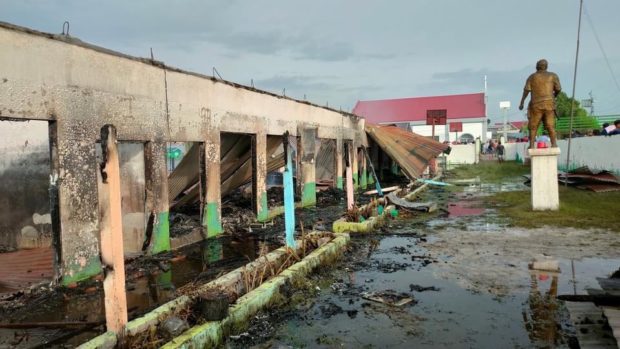Schools need basic services such as electricity, water – Marcos, Angara

At least 108 students lost five classrooms to a fire that gutted Sta. Cruz Elementary School in Masantol town in Pampanga province as Super Typhoon “Karding” lashed Luzon on Sunday night. (Contributed photo dated Sept. 25, 2022)
MANILA, Philippines — President Ferdinand Marcos Jr. and Education Secretary Sonny Angara see the need to focus on the urgency of providing schools and students with basic education infrastructure and services.
They also looked into the schools’ logistical shortages, the growing mental health crisis among students, and the effects of persistent calamities that disrupt learning.
Their views came to the fore after Marcos and Angara recently made rounds of schools in various cities, including Quezon City and Taguig, and provinces, including Bulacan, Laguna, and Agusan del Sur.
The two public officials assessed the situation of the schools after the start of classes on June 16.
“We’re making sure that everyone has electricity, everyone has water. Those are the basic services that we can see so that our youth can study properly,” Marcos said during a school opening in Quezon City.
His views were cited by DepEd in a statement on Tuesday.
READ: Angara vows to assist Taguig gov’t in expanding educational infra
Meanwhile, Angara narrated that during a site visit to Datu Saldong Elementary School, a remote campus that previously lacked electricity in Agusan del Norte, absences among its 46 students became a problem “because children were distracted.”
He said when the electricity was installed in their classrooms, the students no longer wanted to leave, even to go home.
“It just shows that if we can engage our students, we can really do a lot for our people,” Angara said.
The DepEd likewise revealed that around 1,800 students in Naic, Cavite, attend classes in makeshift structures due to overcrowding and a shortage of spaces inside the classrooms.
On the other hand, it noted that students in Eastern Visayas and other regions do not have licensed guidance counselors, which makes it hard for schools to address cases of bullying and mental health problems.
As for the provinces of Bulacan, Pampanga, and Pangasinan, flooding remains a recurring disaster in low-lying schools, which prevents classes and damages learning materials.
“To ease classroom congestion, DepEd is working with the private sector to build more than 15,000 new classrooms by 2027,” the DepEd said.
“New school buildings are also being designed to withstand natural disasters, including multi-storey structures with open ground floors to prevent damage from flooding,” it added.
Meanwhile, Angara underscored that “mental health is now a central concern in education policy.”
Thus, he said the DepEd is forming Child Protection Committees and recruiting more School Counselor Associates and Division Counselors.
In the same statement, the DepEd reported that the department’s expanded School-Based Feeding Program has covered more kindergarten learners – from 360,000 in 2024 to 1.4 million this year.
It did not say how many more students have yet to be reached by the feeding program.
READ: DepEd: Recovery efforts mobilized for San Francisco High School
The department also reported that a total of 884,790 teaching positions had been filled as of June 15.
The DepEd also cited the recent report of the Department of Budget and Management, where it has recently completed the approval of 20,000 teaching items that the Department of Education requested for 2025.
Over 20 million public school students returned to classes in June for the school year 2025 to 2026.
“Education is not just about opening schools. It’s about making sure that every classroom is equipped, every teacher supported, and every child given a real chance to learn,” said Angara.
“That means confronting these issues head-on – flooding, congestion, mental health, access — and working with everyone to solve them,” he concluded. /apl